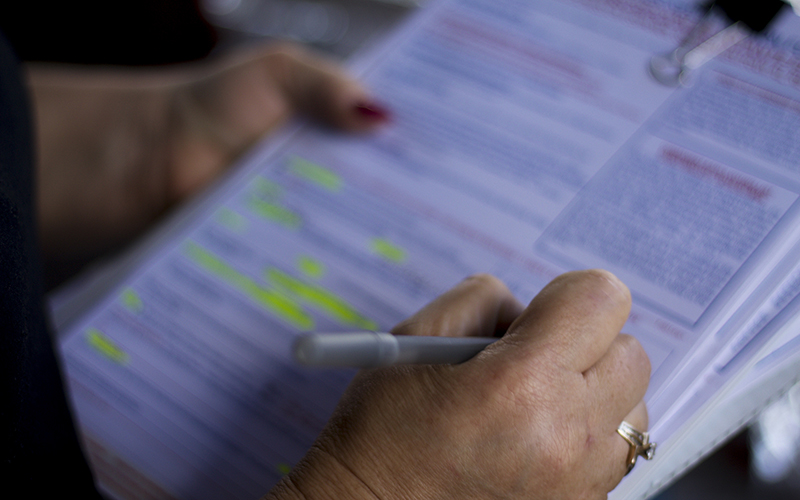- Slug: BC-CNS-Citizen Voters,640
- File photo available (thumbnail, caption below)
By PAT POBLETE
Cronkite News
WASHINGTON – Arizona election officials agreed Monday to settle a lawsuit that claimed the state’s two-track voter registration process was unduly burdensome and “irrationally” disenfranchised thousands of voters.
Arizona voters can register for federal elections with a federal registration form that does not require proof of citizenship, but state registration – which is needed to vote in state and local elections – requires “documentary proof of citizenship.”
A lawsuit last fall by the League of United Latin American Citizens said that requiring documentary proof of citizenship with a voter registration application was needlessly bureaucratic and disenfranchised would-be voters.
Under the proposed settlement, voters will still need to be citizens to vote in state elections, but will no longer have to provide proof of citizenship with their application. Their citizenship status will be checked automatically by the state against the Department of Motor Vehicles database.
The settlement, agreed to by Secretary of State Michele Reagan and Maricopa County Recorder Adrian Fontes, streamlines the process for registering to vote in local and statewide elections.
“We’ve always said that it should be easy to vote and hard to cheat,” said Reagan in a statement released by her office Monday. “I’m proud to say this compromise achieves both.”
Reagan maintained in the settlement agreement that the current registration process is legal. But Fontes said a change in the process was long past due.
“I am pleased that the Secretary of State’s Office came to the same conclusions about the voter suppression created by the bifurcated registration system,” said Fontes in a statement. “It did not serve the voters in this county or the state.”
Fontes said he has been working to update the voter registration process since shortly after his 2016 election, when he said he discovered tens of thousands of voter registration rejection notices sitting unsent in the Maricopa County Recorder’s tabulation center.
“The settlement addresses a major concern I had when I took office and found 96,000 rejected voter registration forms collecting dust in a warehouse,” Fontes said.
Both Fontes and Reagan said the new arrangement will still provide protection against voter fraud.
The new system would tell county recorders that anyone using a federal form should be registered to vote in federal elections, and anyone using a state form with proof of citizenship should be a “full-ballot voter,” eligible to vote in state and federal elections.
State forms without proof of citizenship would be checked overnight against the state’s drivers license database, which would prove citizenship. If it did not, the county recorder would be required to notify the applicant that they cannot vote in local elections until they can prove their citizenship.
The two-track system was born out of Prop 200, a 2004 ballot initiative that requires that proof of citizenship when registering to vote.
The Supreme Court in 2015 said the state could not require proof for voters using the federal form, which requires applicants to check a box attesting to citizenship.
The LULAC lawsuit, brought by the Campaign Legal Center and the Lawyers’ Committee for Civil Rights Under Law, estimated that the process may have disenfranchised roughly 26,000 voters in Maricopa County, and thousands more statewide.
“Secretary Reagan’s agreement to these commonsense changes is an affirmation that democracy works best when all citizens can vote without barriers,” said a statement from Danielle Lang, senior legal counsel at the Campaign legal Center.
“Our lawsuit will successfully protect eligible Arizonans from being unfairly prevented from registering to vote and participating in federal elections because of unnecessary requirements,” her statement said.
Fontes said he was glad to see a change in the system, which put the burden on “applicants to repeatedly show proof of citizenship, even though that information was readily available to the County Recorder’s Office.”
“Thousands of Arizonans were denied the right to vote due to unfair policies and bureaucratic red tape,” he said.
For more stories from Cronkite News, visit cronkitenews.azpbs.org.
^__=
Web links:
_ Proposed settlement: https://docs.google.com/viewerng/viewer?url=http://www.campaignlegalcenter.org/sites/default/files/Consent%2520Decree.pdf
_ Original complaint: https://docs.google.com/viewerng/viewer?url=http://www.campaignlegalcenter.org/sites/default/files/lulacvreagancomplaint.pdf
_ Arizona voter registration regulations: https://www.azleg.gov/viewdocument/?docName=https://www.azleg.gov/ars/16/00152.htm
_ 2004 Proposition 200: http://apps.azsos.gov/election/2004/general/initiative_petition.pdf
^__=
A woman fills out a voter registration form at a Phoenix farmers market in a 2016 photo. Arizona requires proof of citizenship to register for state and local racess, which is not changing, but election officials hope to streamline applications after being sued over the process by advocacy groups. (Photo by Courtney Columbus/News21)
